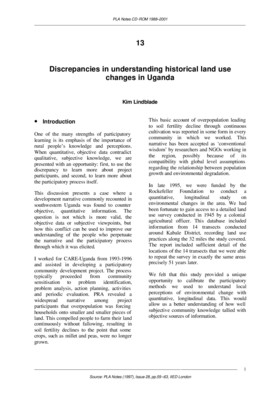PLA Notes CD-ROM 1988-2001 13 Discrepancies in understanding historical land use changes in Uganda

Document begins: PLA Notes CD-ROM 19882001 13 Discrepancies in understanding historical land use changes in Uganda Kim Lindblade · Introduction This basic account of overpopulation leading to soil fertility decline through continuous One of the many strengths of participatory cultivation was reported in some form in every learning is its emphasis of the importance of community in which we worked. This rural people's knowledge and perceptions. narrative has been accepted as `conventional When quantitative, objective data contradict wisdom' by researchers and NGOs working in qualitative, subjective knowledge, we are the region, possibly because of its presented with an opportunity: first, to use the compatibility with global level assumptions discrepancy to learn more about project regarding the relationship between population participants, and second, to learn more about growth and environmental degradation. the participatory process itself. In late 1995, we were funded by the This discussion presents a case where a Rockefeller Foundation to conduct a development narrative commonly recounted in quantitative, longitudinal study on southwestern Uganda was found to counter environmental changes in the area. We had objective, quantitative information. The been fortunate to gain access to a detailed land question is not which is more valid, the use survey conducted ...
Cite this publication
Available at https://www.iied.org/g01682